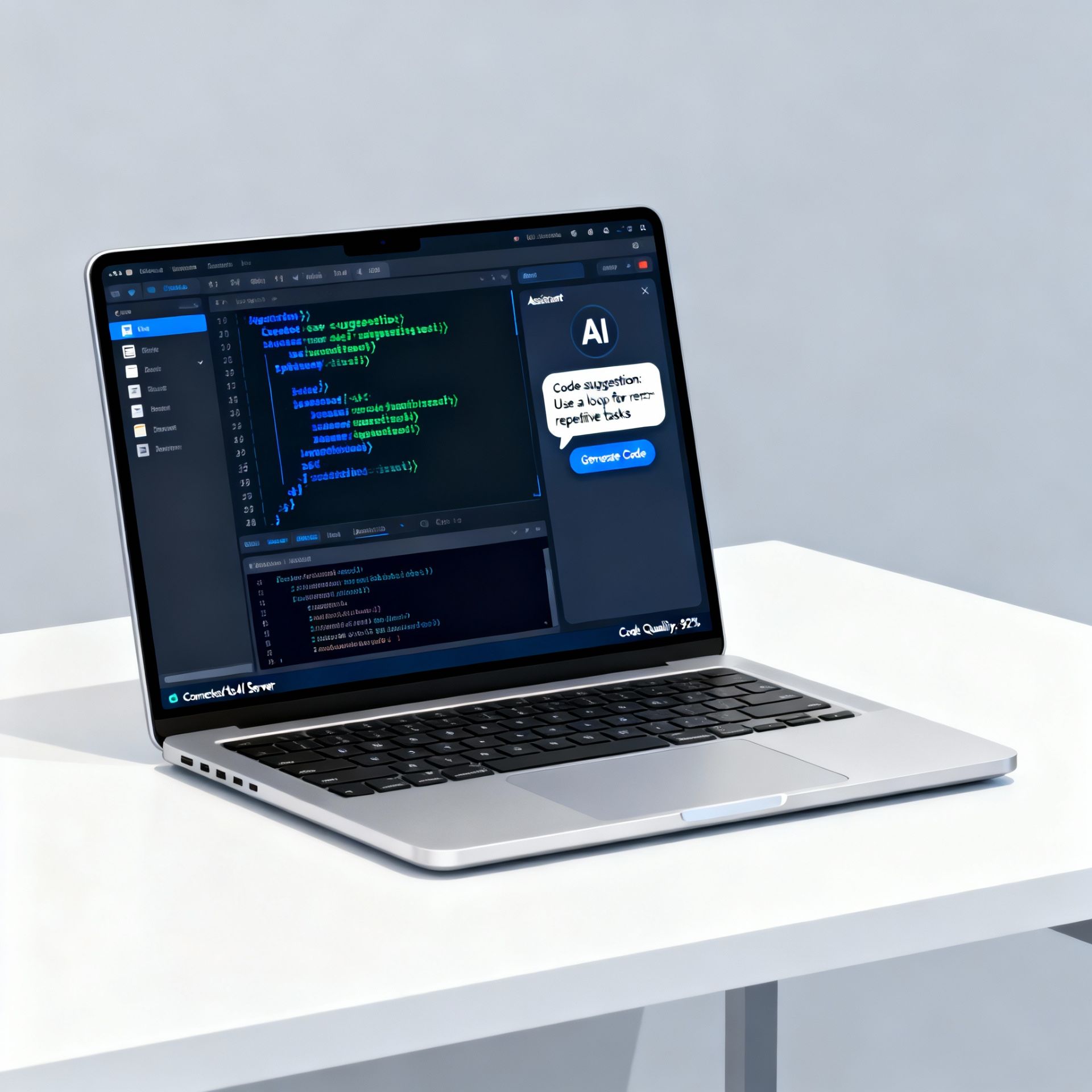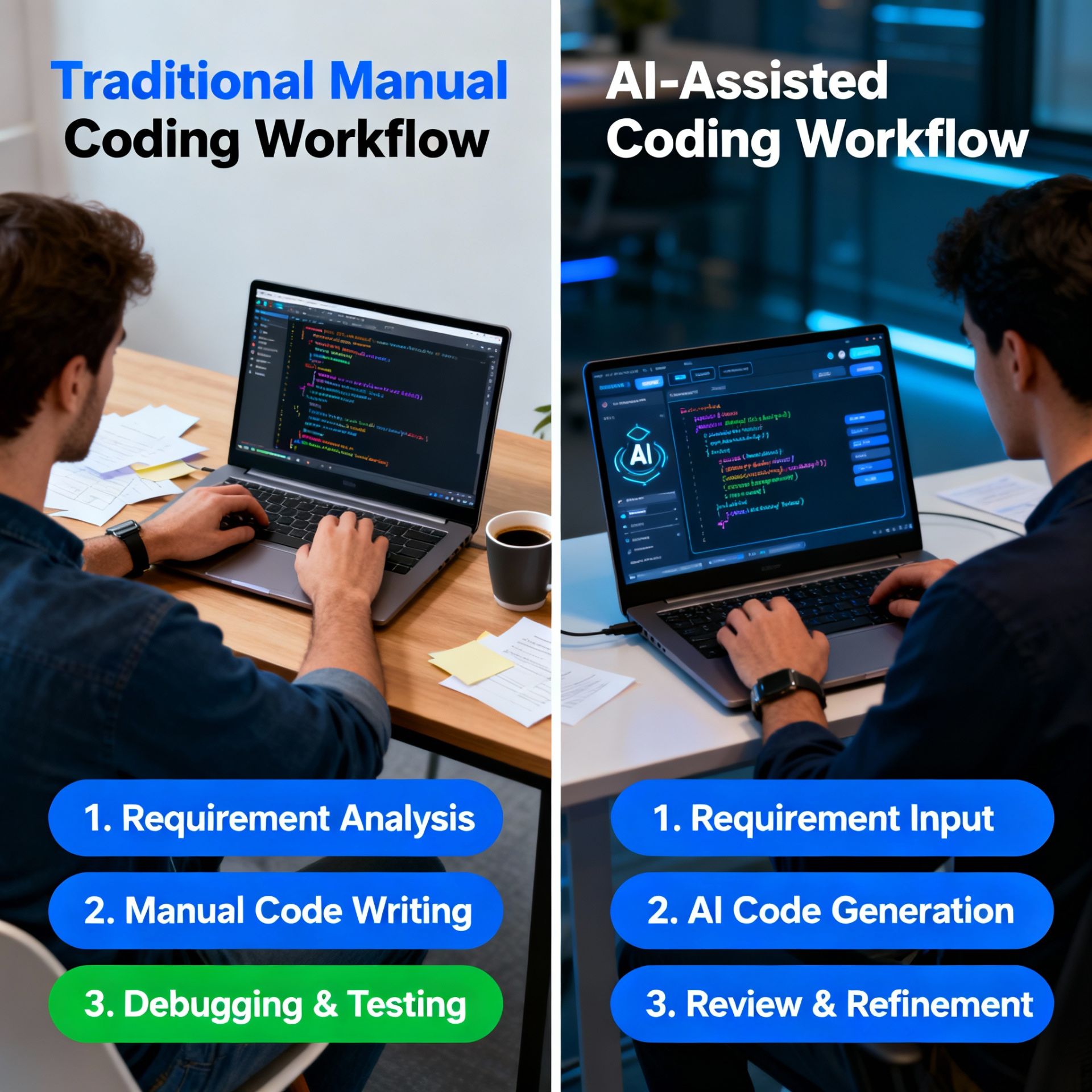The programming landscape has completely transformed in 2025, and developers who aren't leveraging AI coding tools are already falling behind. Gone are the days of manually writing boilerplate code, debugging for hours, or struggling with complex deployments. Today's AI assistants don't just suggest code completions—they architect entire applications, fix bugs autonomously, and even deploy to production with minimal human intervention.
The revolution isn't coming—it's already here. Let's dive into the most groundbreaking AI coding tools that are reshaping how we build software in 2025.
The New Kings: Tier-S AI Coding Assistants
Cursor AI: The Ultimate AI-Powered IDE
Cursor has emerged as the undisputed champion of AI-powered development environments in 2025. Built on a VS Code foundation but supercharged with cutting-edge AI capabilities, Cursor offers features that feel genuinely magical:
Revolutionary Agent Mode - Cursor's Agent Mode now operates as the default chat experience, capable of roaming your entire project to add files, tests, and configurations autonomously. Ask it to "Build a user registration page," and watch it create not just the component, but the complete authentication flow, database schemas, and test suites.
Context-Aware Everything - Through its advanced .cursorrules system, Cursor understands your project's coding standards, conventions, and architectural patterns. It silently follows your team's guidelines, from commit message formatting to function naming conventions.
Multi-File Mastery - The Composer feature excels at handling complex, multi-file changes with intelligent diff previews. Large-file tools ensure it no longer struggles with massive codebases, while background agents allow you to continue coding while long tasks execute.

Windsurf: The First AI-Native IDE
Windsurf by Codeium represents a paradigm shift toward AI-native development. Unlike traditional IDEs with AI bolted on, Windsurf was designed from the ground up as an AI agent-powered environment:
Cascade Flow System - Windsurf's Cascade automatically indexes your entire codebase and tracks changes rippling through complex projects. This makes it exceptionally powerful for large-scale refactoring tasks that span multiple repositories.
Zero-Configuration AI - The platform writes AI-generated code directly to disk before approval, allowing you to see changes in your development server immediately. This eliminates the traditional copy-paste workflow that slows down other tools.
Visual-First Approach - Windsurf Previews let you see your website live in the IDE, click on any element, and let Cascade reshape it instantly. From preview to production deployment—all without leaving the editor.
Claude 3.5 Sonnet: The Coding Powerhouse
Claude 3.5 Sonnet has established itself as the premier coding model in 2025, now integrated directly into GitHub Copilot. What makes Claude exceptional for coding:
Unmatched Problem-Solving - In internal evaluations, Claude 3.5 Sonnet solved 64% of coding problems compared to 38% from its predecessor. It excels at fixing bugs and adding functionality to open-source codebases from natural language descriptions.
Computer Use Capabilities - Claude's groundbreaking computer use feature allows it to control computers like humans do—looking at screens, moving cursors, clicking, and typing. This enables end-to-end development workflows that were previously impossible.
Production-Ready Code - Claude consistently generates high-quality, contextual code that matches project patterns and conventions. Its integration with GitHub Copilot brings these capabilities to over 100 million developers.
Game-Changing Specialist Tools
Aider: Terminal-Based AI Pair Programming
Aider continues to dominate terminal-based AI coding in 2025. This open-source tool connects to major LLMs and works seamlessly within your existing Git workflow:
Voice-to-Code Commands - Speak with Aider about your code and request new features, test cases, or bug fixes using your voice
Automatic Git Integration - Aider commits changes with sensible commit messages and integrates with familiar Git tools for easy diff management
Multi-Language Excellence - Achieves 84.9% correctness using o3-pro on comprehensive coding benchmarks
Qodo Gen: The Quality-First Assistant
Qodo Gen (formerly Codium AI) has carved out a unique niche focusing on code integrity and quality. Rather than just generating code, Qodo emphasizes:
Comprehensive Testing - Automatically generates unit tests that validate core functionality and edge cases
Code Review Integration - Provides pre-pull request reviews and quality checks directly in your IDE
Multi-Agent Architecture - Uses specialized AI agents for different aspects of development, from testing to documentation
Replit Ghostwriter: Browser-Based Development Revolution
Replit Ghostwriter has evolved into a comprehensive AI coding ecosystem within the browser. Key capabilities include:
Real-Time Code Review - Continuously evaluates your code for logic errors, performance issues, and optimization opportunities
Full-Stack Integration - Handles everything from frontend React components to backend API endpoints and database queries
Zero Setup Required - Everything runs in the browser with no local configuration needed

The New Wave: Full-Stack AI App Builders
Bolt.new: From Prompt to Production
Bolt.new by StackBlitz represents the future of full-stack development. Unlike traditional tools that only assist with code generation, Bolt.new provides complete environment control:
Full-Stack in Browser - Install npm packages, run Node.js servers, and interact with third-party APIs directly in the browser
AI Environment Control - Give AI models complete control over the filesystem, servers, package managers, and terminals
Deploy from Chat - Build and deploy production applications through conversational prompts
Lovable.dev: Visual-First App Building
Lovable has positioned itself as the go-to tool for rapid prototyping and MVP development. Its strength lies in:
Speed to Scaffold - Generate multi-page applications with UI components, routing, and starter logic in minutes
Conversational Iteration - Combine visual edits with natural language instructions for intuitive development
Git Integration - Export to GitHub and adopt traditional PR workflows when ready to scale
Enterprise-Grade Solutions
GitHub Copilot: The Universal Standard
GitHub Copilot remains the most widely adopted AI coding assistant, now enhanced with multiple model options:
Multi-Model Support - Choose between GPT-4o, Claude 3.5 Sonnet, Gemini 2.0 Flash, and OpenAI o1 models
Enterprise Integration - Knowledge base integration, custom model fine-tuning, and comprehensive policy management
Universal IDE Support - Native integration across VS Code, JetBrains IDEs, Neovim, and web browsers
JetBrains AI Assistant: Deep IDE Integration
JetBrains AI Assistant provides specialized support for professional development environments:
Context-Aware Completions - Deep integration with JetBrains IDEs for project-wide code analysis
Local Model Support - Ability to run models locally via Ollama for privacy-sensitive projects
Junie AI Agent - New AI agent focused on task delegation and code quality verification
Specialized Tools for Specific Needs
Tabnine: Privacy-First AI Coding
Tabnine stands out for its privacy-focused approach and ability to learn from your specific codebase:
Zero Data Retention - Protects code confidentiality with strong privacy policies
Custom Model Training - Learn from your team's coding patterns and enforce standards
Ethical Training Data - Uses responsibly sourced training data without copyright concerns
Amazon CodeWhisperer: Cloud-Native Development
Amazon CodeWhisperer excels for teams working in AWS environments:
Security Scanning - Built-in vulnerability detection and security remediation
AWS Integration - Optimized for services like S3, Lambda, and other AWS APIs
Reference Tracking - Helps manage license compliance by flagging open-source similarities
The Future is Agentic
The biggest trend in 2025 is the shift from simple code completion to agentic AI systems that can reason, plan, and execute complex multi-step tasks. These systems:
Understand Context Across Repositories - Modern AI tools index entire codebases and understand dependencies across services
Automate Entire Workflows - From code generation to testing, deployment, and monitoring
Reduce Context Switching - Handle research, documentation, and coordination tasks autonomously
Choosing the Right Tool for Your Needs
The best AI coding tool depends on your specific workflow and requirements:
For Rapid Prototyping: Bolt.new or Lovable for quick MVP development
For Professional Development: Cursor or Windsurf for comprehensive AI-native IDEs
For Terminal Users: Aider for command-line focused workflows
For Enterprise Teams: GitHub Copilot or JetBrains AI Assistant for established workflows
For Quality Focus: Qodo Gen for testing and code integrity
For Privacy: Tabnine or local models via Aider
The Bottom Line
AI coding tools in 2025 aren't just productivity enhancers—they're fundamental shifts in how software gets built. Developers who master these tools are shipping faster, writing better code, and focusing on high-level architecture rather than implementation details.
The question isn't whether to adopt AI coding tools, but which combination will accelerate your specific workflow. With many offering free tiers or trials, there's never been a better time to experiment and find your perfect AI coding companion.
The future of programming is collaborative, intelligent, and incredibly exciting. Welcome to the age of AI-augmented development—where your ideas become reality at the speed of thought.



